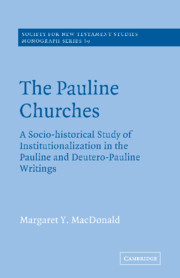 The Pauline Churches
The Pauline Churches Published online by Cambridge University Press: 10 December 2009
In this investigation, insights from the social sciences will be drawn upon in addition to relying on historical methods with the aim of presenting a more complete description of development in the Pauline/deutero-Pauline circle. The following discussion sets out the social scientific theory that will be employed.
The symbolic universe
Peter L. Berger and Thomas Luckmann's The Social Construction of Reality is of primary significance for this investigation of institutionalization in the Pauline movement. The Social Construction of Reality is a treatise on the sociology of knowledge – a branch of sociology devoted to the study of the relation between human thought and the social context in which it arises. The fundamental thesis of Berger and Luckmann's study is that the relationship between the individual as producer, and the individual's social world, the product, is a dialectical one. Berger and Luckmann consider society in terms of both subjective and objective reality; they explore how externalized products of human activity attain the character of objectivity. They assert that the objectivity of the institutional world is a humanly produced objectivity. However, the institutional world acts back on the producer. Internalization occurs when this world is retrojected into the consciousness of the individual in the course of socialization and becomes subjectively meaningful. In other words, the individual and the individual's social world interact with each other.
To save this book to your Kindle, first ensure [email protected] is added to your Approved Personal Document E-mail List under your Personal Document Settings on the Manage Your Content and Devices page of your Amazon account. Then enter the ‘name’ part of your Kindle email address below. Find out more about saving to your Kindle.
Note you can select to save to either the @free.kindle.com or @kindle.com variations. ‘@free.kindle.com’ emails are free but can only be saved to your device when it is connected to wi-fi. ‘@kindle.com’ emails can be delivered even when you are not connected to wi-fi, but note that service fees apply.
Find out more about the Kindle Personal Document Service.
To save content items to your account, please confirm that you agree to abide by our usage policies. If this is the first time you use this feature, you will be asked to authorise Cambridge Core to connect with your account. Find out more about saving content to Dropbox.
To save content items to your account, please confirm that you agree to abide by our usage policies. If this is the first time you use this feature, you will be asked to authorise Cambridge Core to connect with your account. Find out more about saving content to Google Drive.